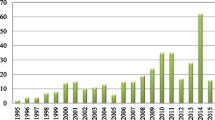Abstract
Purpose: The purpose of the article is to develop a model of trust management in the age of the Internet of Things from the positions of various interested parties. Methodology: Quantitative substantiation of the existence of the problem of trust and determination of the factors of trust to digital technologies in the age of the Internet of Things are performed with the method of regression analysis. This method is used for analyzing the dependence of the share of E-trade in the general structure of retail as an indicator of public interest in digital modernization of economy and the index of society informatization as an indicator of society’s readiness for the Fourth industrial revolution on the cyber security index as an indicator of digital risks, and dependence of the digital competitiveness index as an indicator of advantages on digital modernization. The research objects are countries in which the share of E-trade was the highest in 2018—which allows covering developed and developing countries. Results: It is determined that as of now (2018, despite the high level of cyber security and digital competitiveness, the share of E-trade and level of society’s informatization are low. This proves global public mistrust to digital technologies on the whole and to the Internet of Things in particular. It is concluded that social adaptation to digital modernization of economy on the basis of the Internet of Things is largely determined by the trust, which factors are advantages that are gained from digital modernization (their indicator is the level of digital competitiveness) and digital risks (their indicator is the level of cyber security). Thus, it is necessary to control trust and overcome the social barriers on the path of the Fourth industrial revolution. Recommendations: It is recommended to use the developed and presented model of trust management in the age of the Internet of Things from the positions of various interested parties, in which the tools of management are increase of digital literacy and social advertising of the Internet of Things—for mass translation of advantages from digital modernization, and increase and high level of cyber security—for reducing the risks of this process.
Access this chapter
Tax calculation will be finalised at checkout
Purchases are for personal use only
Similar content being viewed by others
References
Bogoviz, A. V. (2019). Industry 4.0 as a new vector of growth and development of knowledge economy. Studies in systems, decision and control, 169(1), 85–91.
Bogoviz, A. V., Osipov, V. S., Chistyakova, M. K., & Borisov, M. Y. (2019). Comparative analysis of formation of industry 4.0 in developed and developing countries. Studies in systems, decision and control, 169(1), 155–164.
Popkova, E. G. (2017). Economic and legal foundations of modern Russian society: a new institutional theory. Advances in research on Russian business and management, Charlotte (North Carolina) USA; Information Age Publishing.
Popkova, E. G. (2019). Preconditions of formation and development of industry 4.0 in the conditions of knowledge economy. Studies in Systems, Decision and Control, 169, 65–72.
Popkova, E. G., Sergi, B. S. (2019). Will Industry 4.0 and Other Innovations Impact Russia’s Development?. In Exploring the future of Russia’s economy and markets (pp. 34–42), Bingley, UK: Emerald Publishing.
Popkova, E. G., Zhuravleva, I. A., Abramov, S. A., Fetisova, O. V., & Popova, E. V. (2019). Digitization of taxes as a top-priority direction of optimizing the taxation system in modern Russia. Studies in Systems, Decision and Control, 182, 169–175.
Sukhodolov, A. P., Popkova, E. G., & Litvinova, T. N. (2018). Models of modern information economy: conceptual contradictions and practical examples (pp. 1–38). Bingley, UK: Emerald Publishing Limited.
AlHogail, A., & AlShahrani, M. (2019). Building consumer trust to improve Internet of Things (IoT) technology adoption. Advances in Intelligent Systems and Computing, 775, 325–334.
Al-Momani, A. M., Mahmoud, M. A., & Ahmad, M. S. (2019). A review of factors influencing customer acceptance of internet of things services. International Journal of Information Systems in the Service Sector, 11(1), 54–67.
Farhan, L., & Kharel, R. (2019). Internet of Things: Vision, Future Directions and Opportunities. Smart Sensors, Measurement and Instrumentation, 29, 331–347.
Assante, D., Romano, E., Flamini, M., (…) Pascoal, A., & Spatafora, M. (2018). Internet of Things education: Labor market training needs and national policies. In IEEE Global Engineering Education Conference, EDUCON, 2018-April, pp. 1846–1853.
Bagheri, M., & Movahed, S. H. (2017). The Effect of the Internet of Things (IoT) on Education Business Model. In Proceedings—12th International Conference on Signal Image Technology and Internet-Based Systems, SITIS 2016, 7907501, pp. 435–441.
IMD. (2018). World Digital Competitiveness Ranking 2018 results. https://www.imd.org/wcc/world-competitiveness-center-rankings/world-digital-competitiveness-rankings-2018/. Data Accessed: 14.11.2018.
International Telecommunication Union. (2018и). Measuring the information society report 2018. https://www.itu.int/net4/ITU-D/idi/2017/. Data Accessed: 14.11.2018.
International Telecommunication Union. (2018ф). Global Cybersecurity Index. https://www.itu.int/dms_pub/itu-d/opb/str/D-STR-GCI.01-2017-PDF-E.pdf. Data Accessed: 14.11.2018.
Statista. (2018). E-commerce sales as percentage of total retail sales in selected countries in 2017. https://www.statista.com/statistics/255083/online-sales-as-share-of-total-retail-sales-in-selected-countries/. Data Accessed: 14.11.2018.
Author information
Authors and Affiliations
Corresponding author
Editor information
Editors and Affiliations
Rights and permissions
Copyright information
© 2019 Springer Nature Switzerland AG
About this chapter
Cite this chapter
Bogoviz, A.V., Tsvetkova, L.I., Bodiako, A.V., Gimelshteyn, A.V., Tretyakova, I.O. (2019). The Model of Trust Management in the Age of the Internet of Things from the Positions of Various Interested Parties. In: Popkova, E. (eds) Ubiquitous Computing and the Internet of Things: Prerequisites for the Development of ICT. Studies in Computational Intelligence, vol 826. Springer, Cham. https://doi.org/10.1007/978-3-030-13397-9_119
Download citation
DOI: https://doi.org/10.1007/978-3-030-13397-9_119
Published:
Publisher Name: Springer, Cham
Print ISBN: 978-3-030-13396-2
Online ISBN: 978-3-030-13397-9
eBook Packages: Intelligent Technologies and RoboticsIntelligent Technologies and Robotics (R0)




